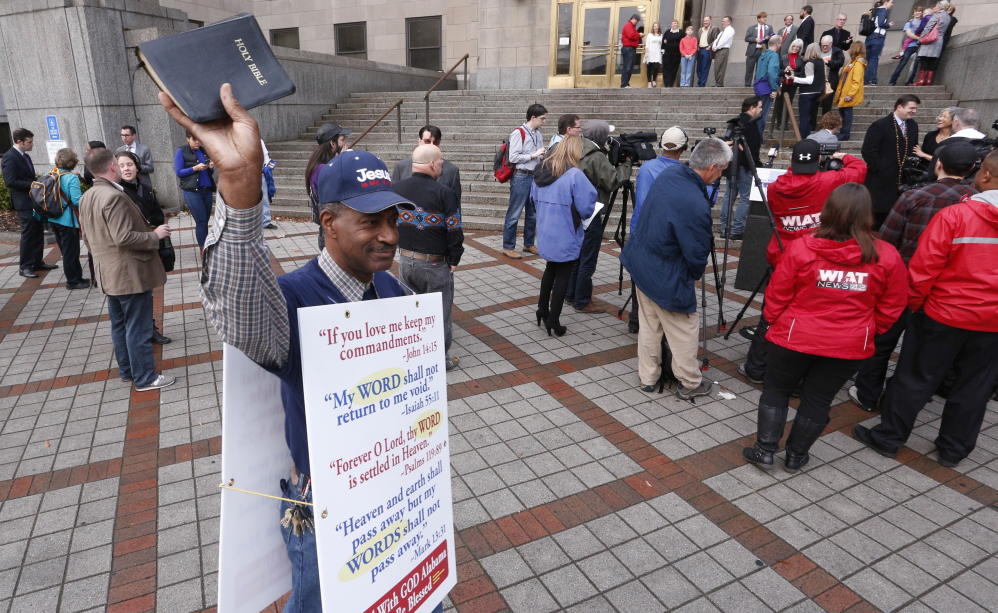Conservative evangelicals and Catholics are clear on their theological divisions. In recent years, though, they have been coming together over a shared fear: the impact of same-sex marriage.
It remains to be seen what the effect on faith groups’ work will be if the Supreme Court legalizes same-sex marriage nationally. But Christian conservatives are worried they could lose their tax-exempt status or government funding. Faith-based groups and governments at all levels partner extensively on social service issues such as homelessness and prison education.
This week at Georgetown University, conservative evangelicals and Catholics teamed up in a joint summit on how faith groups can help alleviate poverty, featuring President Obama and Harvard political scientist Robert Putnam as guest panelists.
While Catholics and evangelicals have long worked together on reducing poverty, those efforts primarily focused on supporting traditional marriage and sexual mores.
But at the Georgetown summit, Catholics and evangelicals also discussed the minimum wage, job training and income tax credits.
Some leaders said the focus on new topics was a deliberate attempt to get out ahead of the expected fallout for faith-based institutions if the Supreme Court rules in favor of gay marriage in June.
‘SOMEBODY HAS TO LOSE’
“Somebody has to lose. Unfortunately, it’s a zero-sum game when it comes to whose rights prevail,” said Focus on the Family president Jim Daly. “Once that’s decided, we’re going to have to figure out how to behave in the culture.”
By focusing on poverty, more conservative religious leaders appear willing to bridge a gap with Democrats and progressives. But some religious leaders are deeply concerned over how gay rights might impact religious involvement in the delivery of social services going forward.
For instance, will religious social service agencies be required to place children for adoption with same-sex couples? Catholic Charities in Illinois, Massachusetts and the District of Columbia have closed their adoption units because of same-sex marriage.
“They’re saying faith-based groups, you can participate, but we don’t want to hear from you. We want your manpower, we want your hours and your cash, but don’t bring anything else into the equation,” Daly said.
Leaders of religious institutions, including colleges, hospitals and nonprofits, are waiting to see how the Supreme Court decision might affect issues such as accreditation, government funding and tax exemption. Faith-based organizations like Catholic Charities and World Vision receive government funding for their services.
Already there are hints of what may come.
During oral arguments on April 28, Supreme Court Justice Samuel Alito raised the issue of Bob Jones University in South Carolina, which lost its tax-exempt status for barring interracial dating and marriage long after bans on interracial marriage were struck down by the Supreme Court.
Recently the InterVarsity Christian Fellowship, an evangelical campus ministry which has corralled hundreds of thousands of students to work on issues such as poverty, was denied recognition on several California campuses because it did not sign a nondiscrimination statement.
John Inazu, a law professor at Washington University School of Law, raised the topics of possible clashes between religious freedom concerns and the gay equality movement at the Faith Angle Forum, a gathering of journalists and academics held in Florida this month.
BROADER PARTNERSHIPS
“Setting aside the overblown rhetoric in all directions, there does seem to be a real difference for the framing of ‘religious liberty’ and ‘the American culture wars’ when the battle lines move from issues like school prayer and vouchers – or even cake bakers and florists – to questions of whether religious student groups can be on public university campuses, whether religious colleges should be accredited, and whether local school systems should accept volunteer support from churches and ministries,” Inazu said.
A coalition of Catholics and evangelicals formed in the 1970s around issues such as abortion and saw a resurgence with the emergence of same-sex marriage and stem-cell research in the early 2000s.
With renewed enthusiasm, evangelicals and Catholics have expressed a collective appreciation for Pope Francis’s emphasis on evangelism and his distaste for the fancier benefits of the papacy. And they have since collaborated on high-profile political issues.
While the U.S. Catholic bishops led the public opposition to a contraception mandate included in Obama’s health-care law, the evangelical owners of the Hobby Lobby chain took the case to the U.S. Supreme Court. The bishops also filed an amicus brief in a religious liberty case involving Hosanna-Tabor Evangelical Lutheran Church. The annual March for Life has more recently begun to include some non-Catholic speakers. And the two groups have teamed up at the state level to pass abortion restrictions.
But the partnerships between Catholics and evangelicals on poverty are broader and deeper than they have been before, said John Carr, a former top official with the U.S. Conference of Catholic Bishops and one of the conveners of the Georgetown conference.
Among the Catholic and evangelical groups included at the gathering were the right-leaning Opus Dei and Focus on the Family to the left-leaning Nuns on the Bus and Sojourners.
“The range here is unbelievable,” Carr said. “If you wanted to stereotype the two communities, Catholics have been more open to governmental action, evangelicals have been better at private action.”
Send questions/comments to the editors.



Success. Please wait for the page to reload. If the page does not reload within 5 seconds, please refresh the page.
Enter your email and password to access comments.
Hi, to comment on stories you must . This profile is in addition to your subscription and website login.
Already have a commenting profile? .
Invalid username/password.
Please check your email to confirm and complete your registration.
Only subscribers are eligible to post comments. Please subscribe or login first for digital access. Here’s why.
Use the form below to reset your password. When you've submitted your account email, we will send an email with a reset code.